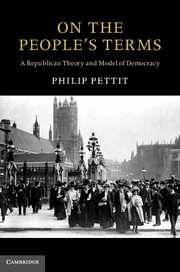Book contents
- Frontmatter
- Contents
- Tables
- Acknowledgements
- Introduction. The republic, old and new
- Chapter 1 Freedom as non-domination
- Chapter 2 Social justice
- Chapter 3 Political legitimacy
- Chapter 4 Democratic influence
- Chapter 5 Democratic control
- Conclusion. The argument, in summary
- References
- Name index
- Subject index
- References
Chapter 5 - Democratic control
Published online by Cambridge University Press: 05 January 2013
- Frontmatter
- Contents
- Tables
- Acknowledgements
- Introduction. The republic, old and new
- Chapter 1 Freedom as non-domination
- Chapter 2 Social justice
- Chapter 3 Political legitimacy
- Chapter 4 Democratic influence
- Chapter 5 Democratic control
- Conclusion. The argument, in summary
- References
- Name index
- Subject index
- References
Summary
According to the argument developed in Chapter 3, a state will be legitimate to the extent that the order it imposes on its citizens is imposed under popular control. But, so the argument continued, people will control the state just insofar as they have an individualized, unconditioned and efficacious influence that pushes it in a direction that they find acceptable. First, the people must have an influence on government that is individualized, unconditioned and efficacious. And, second, they must exercise this influence to a purpose or direction that individuals – or at least those who are prepared to live on equal terms with one another – find acceptable. People must have such a power over government that the regime can be described, in a rich, egalitarian sense of the term, as democratic: a regime that establishes the kratos, or ‘control’, of the demos, or ‘people’.
This conclusion gave us the task of spelling out how the institutions of a society might meet this design specification and implement a republican conception of democracy. We took up that task in the previous chapter, when we looked at how the people might be given individualized, unconditioned and efficacious influence over government. Without being able to go into detail, we saw that that job specification was likely to require an open electoral system under which individualization would be achieved by the possibility of individualized contestation; unconditioned independence by the resistive character of the citizenry; and efficacy by the insulation of the channels of popular influence against the distorting effects of electoral pressures and private lobbies. Under this image, the political institutions would require many amendments in even the best-practice democracies today; but they would not be so distant from current arrangements as to seem utterly infeasible or utopian.
- Type
- Chapter
- Information
- On the People's TermsA Republican Theory and Model of Democracy, pp. 239 - 292Publisher: Cambridge University PressPrint publication year: 2012

